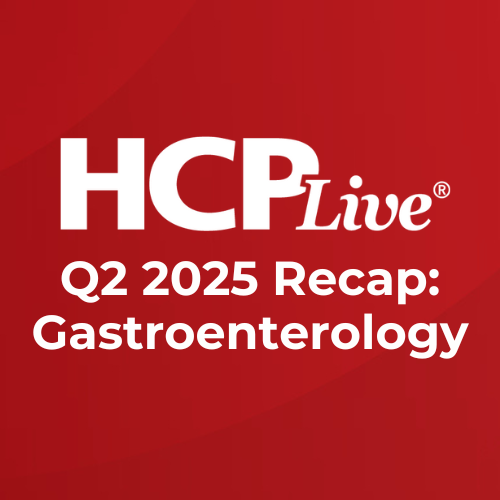The second quarter of 2025 brought forward a wave of promising clinical data and cross-disciplinary insights across gastroenterology.
Key developments spotlighted at Digestive Disease Week (DDW) 2025 included phase 2a success for EBX-102-02 in irritable bowel syndrome with constipation (IBS-C), stronger follow-up screening rates with stool DNA testing for colorectal cancer screening, and encouraging results for fecal microbiota therapies in treating and preventing recurrent Clostridioides difficile infection (CDI).
Other notable GI research from Q2 called attention to the gut-brain connection and cross-specialty collaboration. New data linked diet patterns to global IBS severity, explored anxiety’s impact on diet and microbiome health, and emphasized the overlap between GI and dermatologic immune conditions—paving the way for more integrated care approaches.
Here’s a recap of what made headlines in Q2 of 2025:
Highlights from DDW 2025
EBX-102-02, A Full-Spectrum Microbiome Drug, Shows Promise for IBS-C in Phase 2a Trial
Phase 2a data from the from the Treating IBS with an Intestinal Microbiota Product for Health (TrIuMPH) trial presented at DDW 2025 suggest EBX-102-02, a next-generation oral full-spectrum microbiome drug, is safe, tolerable, and leads to improvements in IBS-Symptom Severity Scale (IBS-SSS), abdominal pain, and stool consistency in patients with IBS-C.
Optimizing Follow-Up Colonoscopy Rates for CRC Screening, with Mark Fendrick, MD
Findings from a series of studies presented at DDW 2025 point to the benefit of initial colorectal cancer screening with a stool-based DNA test, highlighting better adherence to follow-up colonoscopy after a positive result compared with other noninvasive tests. Specifically, the studies looked at this trend in the context of certain variables, including age, geographic location, and race, and consistently demonstrated increased rates of follow-up colonoscopy with initial multitarget stool DNA testing compared with fecal immunochemical tests or fecal occult blood tests
Advances in Managing Recurrent C Diff Infection, with Paul Feuerstadt, MD
In this interview with HCPLive, Paul Feuerstadt, MD, a clinical gastroenterologist and an associate clinical professor of medicine at Yale University School of Medicine/PACT-Gastroenterology Center, broke down recent advances in treating recurrent C diff and reviewed pooled data from 5 clinical trials highlighting the safety and administration of fecal microbiota, live-jslm (Rebyota).
Cross Specialty Care: Collaboration Between Derm and GI
The Connection Between Gut Health and Dermatologic Diseases
In this HCPLive Special Report, advisory board members Raj Chovatiya, MD, PhD, a clinical associate professor of medicine at Rosalind Franklin University Chicago Medical School and as founder and director of the Center for Medical Dermatology and Immunology Research in Chicago, and Adelina Hung, MD, a clinical assistant professor at Rosalind Franklin University Chicago Medical School and director of the IBD program at Sinai Health System Chicago, explore the growing clinical and research intersections between dermatology and gastroenterology. Framed by their shared academic background and personal relationship as husband and wife, the conversation offers a detailed, cross-disciplinary look at how immune-mediated diseases of the skin and gut overlap—and how a collaborative care model can enhance outcomes for patients.
Advances in C Diff Prevention, Management
Fecal Microbiota Transplantation Shows Promise for First-Line Primary C Diff Treatment
Findings from this randomized, open-label, noninferiority phase 3 trial suggest fecal microbiota transplantation (FMT) may be a viable first-line treatment for primary CDI, highlighting its noninferiority to standard-of-care vancomycin. The trial, which was conducted at 20 hospitals in Norway, found clinical cure and no disease recurrence within 60 days without additional treatment occurred in 66.7% of patients with FMT versus 61.2% with vancomycin.
AI Tool Shows Promise for Antimicrobial Stewardship, C Diff Prevention in Hospitals
Research from Michigan Medicine suggests use of an AI-guided infection prevention bundle may support CDI prevention and antimicrobial stewardship in hospital settings. The study compared patient outcomes pre- and post-implementation of a previously validated institution-specific AI model for CDI risk prediction and found that although use of the AI bundle was not associated with a significant reduction in CDI incidence, it was linked to substantial reductions in CDI-associated antimicrobial use.
Novel IBS, DGBI Research
Regional Dietary Patterns Tied to Global Prevalence, Severity of IBS
Findings from this analysis of Rome Foundation Global Epidemiology Study data highlight diet’s influence on the development and severity of IBS, which is estimated to affect anywhere from 5-10% of the global population. Specifically, the study identified 4 dietary pattern clusters adjusted by age, country and religion, that were associated with differences in both the global prevalence and severity of IBS.
DGBI Common in Children with Adequately Managed Celiac Disease, Study Finds
Findings from this study suggest DGBI are common in pediatric patients with celiac disease (CeD) despite adequate adherence to a gluten-free diet and declining tissue transglutaminase immunoglobulin A (TTG IgA) values. The retrospective chart review included nearly 200 pediatric CeD patients receiving care at Cincinnati Children’s Hospital Medical Center and found 43% of the cohort met Rome IV DGBI diagnostic criteria, mostly for functional constipation and functional abdominal pain, suggesting clinicians should consider DGBI in their patients who have persistent CeD symptoms despite adequate disease management.
GI Symptom Related-Anxiety Drives Restrictive Eating in IBS
Research presented at DDW 2025 by Jeemin Kwon, MD, an internal medicine resident at the University of California Los Angeles David Geffen School of Medicine, offered novel insight into the complex relationship between diet, anxiety, and the gut microbiome in patients with IBS. In this interview with HCPLive, Kwon explained the critical role GI symptom–related anxiety plays in shaping dietary patterns and altering gut microbiome composition among patients with IBS.
